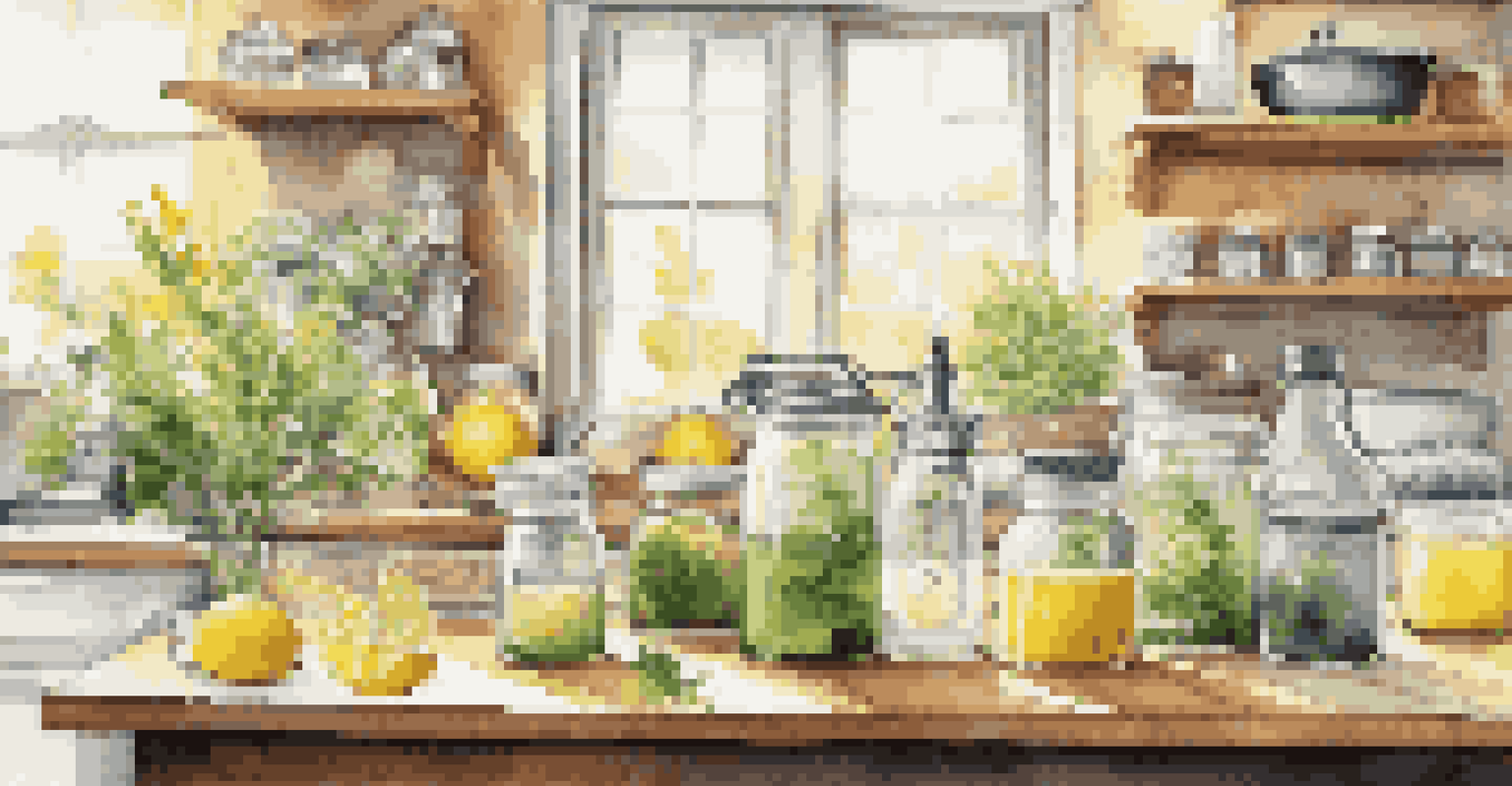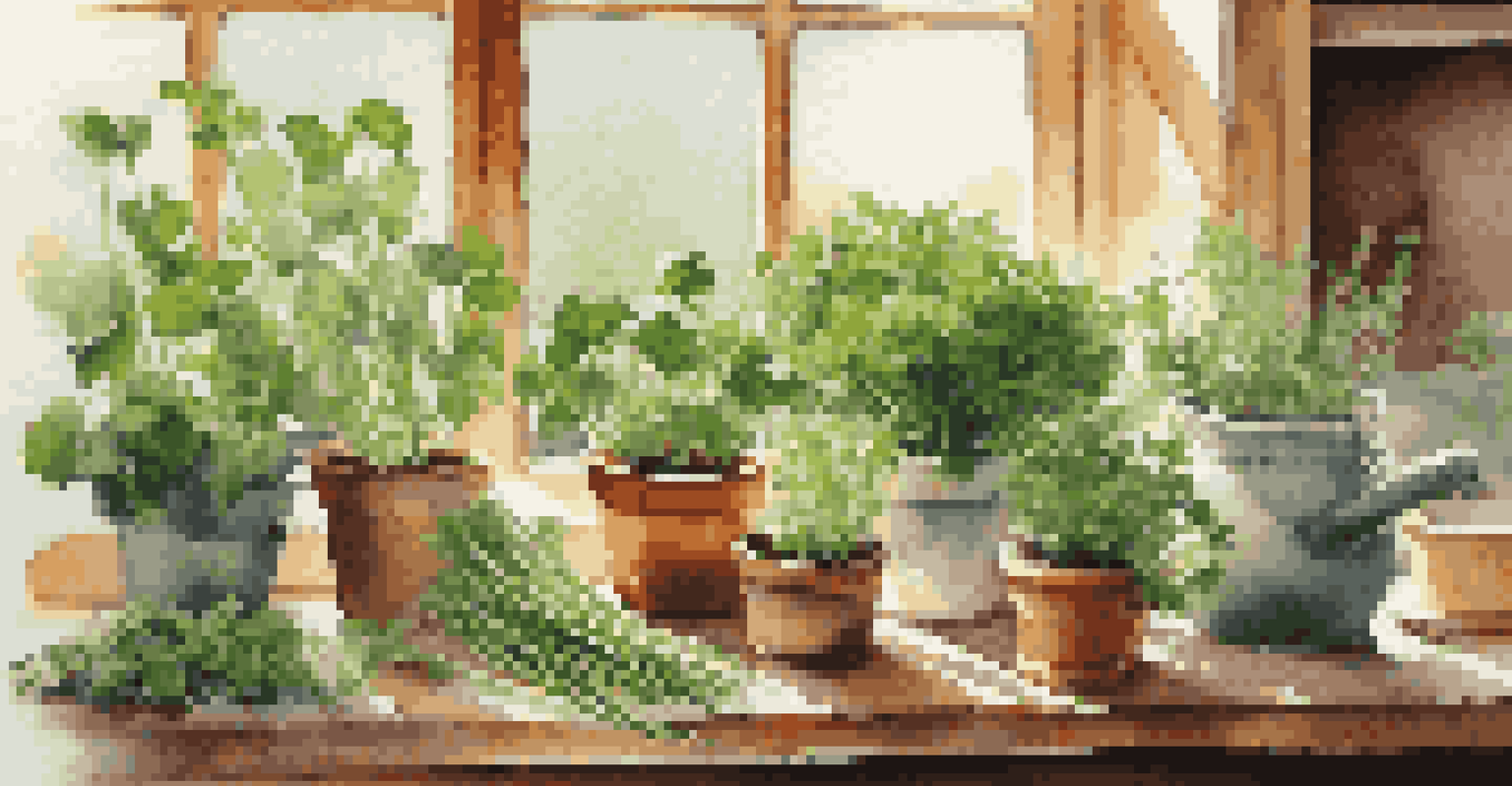Eco-Friendly DIY: 6 Projects for Sustainable Living

Transform Your Waste into Beautiful Planters
One of the simplest ways to embrace sustainability is by recycling. Have you ever thought about turning old containers into charming planters? Not only does it reduce waste, but it also adds a unique touch to your garden or balcony.
The greatest threat to our planet is the belief that someone else will save it.
You can use anything from tin cans to old shoes. Just make sure to add drainage holes at the bottom to keep your plants healthy. With a splash of paint or some creative decorations, these planters can become a focal point in your outdoor space.
This project not only beautifies your environment but also encourages you to think twice before tossing items in the trash. Plus, it's a great conversation starter when friends come over!
Create Natural Cleaning Products at Home
Did you know that many household cleaners contain harsh chemicals that can harm the environment? By making your own natural cleaning products, you can ensure a safer home for your family and the planet. Ingredients like vinegar, baking soda, and essential oils can work wonders.

For example, mixing vinegar and water creates a fantastic glass cleaner. Or, use baking soda and lemon juice to tackle tough stains. These DIY solutions are not only eco-friendly but also cost-effective, saving you money in the long run.
Repurpose Waste into Planters
Transforming old containers into planters not only reduces waste but also adds a unique aesthetic to your outdoor space.
As you swap out commercial cleaners for your homemade concoctions, you'll also reduce plastic waste from packaging. It's a win-win for your wallet and the environment!
Build a Compost Bin for Kitchen Scraps
Composting is an excellent way to reduce food waste and enrich your garden soil. Building a compost bin can be a fun DIY project that turns kitchen scraps into nutrient-rich compost. You can use wooden pallets or even a large bucket to get started.
We do not inherit the earth from our ancestors, we borrow it from our children.
Start by layering green materials like fruit peels with brown materials like dried leaves. It's nature's way of recycling, and in a few months, you’ll have a fantastic fertilizer for your plants. Just remember to turn the pile occasionally to speed up the process.
By composting, you’re not just reducing landfill waste; you’re also nurturing your plants and creating a sustainable cycle. It’s a tangible way to see the benefits of your eco-friendly efforts!
Make Beeswax Wraps to Replace Plastic Wrap
If you're looking for a simple swap to reduce plastic use, consider making beeswax wraps. These reusable alternatives can cover bowls, wrap sandwiches, or keep your veggies fresh. All you need are some cotton fabric scraps, beeswax, and a little bit of time.
Simply melt the beeswax and brush it onto the fabric, then let it cool. The warmth of your hands will help shape the wrap around food, making it a practical choice for food storage. Plus, they’re washable and last for about a year with proper care.
Make Eco-Friendly Cleaning Products
Creating your own natural cleaning products with simple ingredients like vinegar and baking soda promotes a healthier home and environment.
By using beeswax wraps, you not only cut down on single-use plastic but also support sustainable beekeeping practices. It’s a small change that can make a big difference!
Craft Reusable Shopping Bags from Old T-Shirts
With the growing concern over plastic pollution, reusable shopping bags are a must-have. Instead of buying new ones, why not turn your old t-shirts into functional bags? This DIY project is not only eco-friendly but also a fun way to repurpose clothing that you no longer wear.
Simply cut off the sleeves and neckline, then tie the bottom to create a sturdy bag. You can customize it with fabric paint or patches to make it uniquely yours. These bags are perfect for grocery shopping or running errands, and they fold up easily for storage.
By using these homemade bags, you reduce reliance on plastic and show off your creativity at the same time. Plus, every time you use it, you’ll be reminded of your commitment to sustainable living!
Create a Rainwater Collection System
Collecting rainwater is a fantastic way to conserve water for your garden and reduce your water bill. Setting up a simple rainwater collection system can be easier than you think. All you need is a rain barrel that collects runoff from your roof.
Position the barrel under your downspout, and make sure to cover it with a mesh to keep out debris and mosquitoes. This collected water can be used for watering plants, washing cars, or even filling bird baths. It's a sustainable way to make the most of a natural resource.
Start Composting Kitchen Scraps
Building a compost bin allows you to convert food waste into nutrient-rich compost, supporting a sustainable cycle for your garden.
Implementing a rainwater collection system not only helps the environment but also fosters a greater appreciation for how we use water. You’ll be amazed at how much you can save!
Grow Your Own Herbs Indoors for Fresh Flavor
Growing your own herbs is a delightful way to incorporate sustainability into your cooking. Even if you lack outdoor space, herbs can thrive in small pots on a windowsill. Imagine having fresh basil, mint, or parsley at your fingertips while you cook!
Start with easy-to-grow herbs like basil, cilantro, or chives. All they need is sunlight, water, and a little love. Not only do they enhance the flavor of your dishes, but they also reduce the carbon footprint associated with store-bought herbs.

By cultivating your own herbs, you’re not just saving money; you’re also contributing to a more sustainable lifestyle. Plus, there's nothing quite like the satisfaction of harvesting something you've grown yourself!